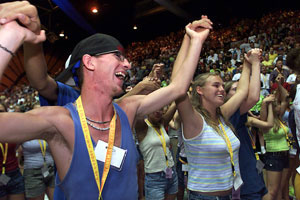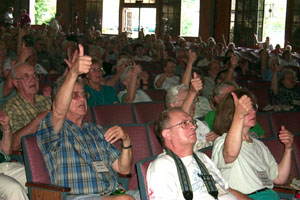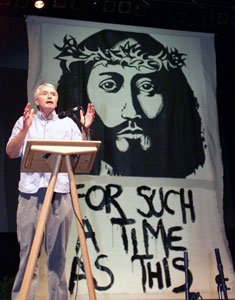
(Matthew 16:13-23)
May these words of this Peter be like a rock,
not a stumbling block!
|
|
"Who do you say
that I am?" Jesus asked. Simon Peter answered, "You
are the Messiah, the Son of the living God." And Jesus
answered, "Blessed are you, Simon son of Jonah! ... You are
Peter (petros), and on this rock (petra)
I will build my church..." Jesus then began to speak of
the rough road ahead. And Peter took him aside and rebuked him... "Get
behind me, Satan!" Jesus replied. "You are a stumbling
block..." (Matthew 16:13-23) May these words of this Peter be like a rock, |
"One generation ... to another"
Message preached
September 15, 2002
Long Green Valley Church of the Brethren
Glen Arm, Maryland USA
based upon Psalm
145:1-8 (specifically v.
4)
Last week, our youth did a wonderful job of leading us in worship - sharing, as they did, of their mountaintop experience at National Youth Conference this past summer. What made this service even more vibrant was the interchange that happened between generations. You see, several of our more "seasoned in years" members had just come back from a conference of their own, and shared from their mountaintop experience. Maybe we should have a "National Older Adult Conference (NOAC) Sunday" for them.
Our worship last Sunday was full of the guitar-led music sung at NYC, giving our organist a bit of a rest. In response, I appreciated what Chris Breidenbaugh said during our time of "Joys and Concerns." He recalled a story told at NOAC about a church which allowed more contemporary music into worship. These people then faced the delightful dilemma of not having enough space in the sanctuary for all the newcomers who started attending... I think the folks at NOAC were challenged to be more open to change, even as they were encouraged to become more actively involved in the life of the church.
 Now, I donít believe that just singing more contemporary music is a cure-all
for the ills of a church. Some congregations add a contemporary worship service
and still fail to grow, for a variety of reasons. To be honest, I am not a fan
of this trend - having different worship services for different audiences. I do
recognize how difficult it is to bring new forms of worship into a more
traditional setting. For many older folks the newer music and styles of worship
just donít feel right. They come away wondering if they have truly worshiped
God. Thatís why many congregations have alternate worship services, so that
each generation can do their own "thing."
Now, I donít believe that just singing more contemporary music is a cure-all
for the ills of a church. Some congregations add a contemporary worship service
and still fail to grow, for a variety of reasons. To be honest, I am not a fan
of this trend - having different worship services for different audiences. I do
recognize how difficult it is to bring new forms of worship into a more
traditional setting. For many older folks the newer music and styles of worship
just donít feel right. They come away wondering if they have truly worshiped
God. Thatís why many congregations have alternate worship services, so that
each generation can do their own "thing."
To me,
this is a shame. The church - you see - is the whole people of God, not
just those who share my particular tastes, who fit into my age
group. While it is important that we have a place where we know and are known by
persons who are walking a path close to our own - sharing our growing
pains, or our growing-old  pains
- it is also vital to our well-being that we connect with the entire body
of Christ and not just our own "system" within it.
pains
- it is also vital to our well-being that we connect with the entire body
of Christ and not just our own "system" within it.
To slightly alter the words of the apostle Paul, "If the whole body were the cardio-vascular system (read in the NOAC generation?), where would the muscular system of the body (the youth?) be? Or, if the whole body were the muscular system, where would the digestive system (folks of my expanding belt-line generation?) be?" (1 Corinthians 12:17). Yes, I know Paul wrote of the eye, the ear, and the nose in that verse, but - as sight, hearing, and the other senses are some of the things older generations complain about gradually losing - I thought Iíd shift things around a bit (eh?). The point is, as Paul said, "there are many members (many parts, many systems, many generations), yet there is one body" (1 Corinthians 12:20).
The church of Jesus Christ is not merely a collection of generations, it thrives best when these generations interact, when we work together as one body - especially in worship, which lies at the center of our life together. That doesnít mean we agree on everything, that my tastes are your tastes, what you like I like. Being "one body" can be difficult, especially when it comes to worship.
As Iíve said before, there are some real generational divides at the present time. Itís not just a matter of old-fashioned hymns versus new songs, organs and pianos against guitars and drums, pages in a hymnal versus words projected on a screen overhead. Working through those differences may be hard enough, but those arenít the only issues. We could solve those conflicts and still not deal with what is at the heart of the matter.
Before the
invention of the printing press several hundred years ago, and the availability
it made possible of Bibles people could afford to possess and read, Godís Word
to the average person was what he or she saw in the Cathedral. More than the
spoken words of the priest - which often were in a language (Latin) most did not
understand - the stained glass  windows
and the other artwork told the story of Godís mighty acts. The message was
visual, told in images.
windows
and the other artwork told the story of Godís mighty acts. The message was
visual, told in images.
There is a very poignant scene in the movie "Amistad," the true story of a group of African slaves who in 1839 took control of the ship carrying them to America, who then ended up on trial in New England for this supposed "crime." The main character was given a Bible while he waited in prison. He could not read the words, but he learned the story from the pictures. Some of the drawings portrayed a man whipped and strung up on a tree, someone who seemed to have a lot in common with those slaves. The message was visual, told in images.
Words are important, make no mistake about that. Sometimes, however, we place too much stock in them. I know I do. When I met with the youth last Spring to talk about worship and work at training them for worship leadership, do you know what one of their big questions was? Why so many words? Our hymns, for instance, are full of words. Us older generations put great stock in the words. We complain if those words are altered, or we carefully craft the alterations, because words are very important to us. Those of us from an older generation may sing some of the newer praise songs and think that the words in them are inadequate, for a variety of reasons, because words are very important to us.
However, the world our young people face is overwhelmed by words. The Internet is a highway familiar to them, a dizzying array of trillions upon trillions of words - more information than anyone could ever digest in millions of lifetimes. Because of this, how we approach words is changing. It has to, for there are just too many words out there to make sense of it all.
I donít wish to go into great detail about why this is, and where things might be heading because, to be honest, Iím not quite sure I know. What I do know is that if, as the Psalmist sings out, "One generation shall laud (praise, lift up, tell in an awesome way) to another what God has done and continues to do," we need to be aware of earth-quaking shifts that are taking place around and between us.
One of the most powerful moments at National Youth Conference took place at the beginning of the message Paul Grout delivered. Our youth hardly mentioned it last Sunday, because it is difficult to put into words a description. Paul had created a video which, in the span of just a few minutes, told the story of the Bible. With a loud, pounding beat in the background, reminiscent of the ticking of the clock or the beating of the human heart, on three huge screens up front were flashed images and words he had drawn or painted, all shown very briefly. The words themselves were but images. We were on the edge of our seats, hardly breathing, trying to keep up with the story, told in what might be termed a "postmodern" way.
At
breakneck speed, we were led from the color of the beginning of Creation to the
stark, black upon white that followed the Fall from grace of Adam and Eve, their
descendants moving through ages of sin and violence and death. And then came
Jesus, and the ticking of the clock, the beating of the human heart, increased
in speed aiming toward a cross... Then, time stopped, the beat ended, and a
heart-wrenching cry stunned the congregation.
Color returned as crucifixion led to an empty tomb and to the promise of a new creation, a new heaven and earth, a resurrected people of God. The music in the background had shifted as well. When the video ended these thousands of youth were absolutely silent. Paul then walked on stage and began painting on a huge canvas laid out on the floor. The image on it, completed earlier, we could not see. Onto the screen above came snippets of a video of him, on a previous occasion, painting the picture. Gradually the face of Jesus was revealed and, when they lifted the canvas, the words he had just painted in broad strokes became visible. They read: "For such a time as this," the conference theme. Again, absolute silence.
It was powerful... Of course, I could have done without all the camera flashes and the extended applause that followed, for this was not a production but a proclamation. However, for better or worse, that is how our society currently responds to that which moves us. To be honest, Iíd rather fight other battles than try to keep applause out of worship, for such an effort turns even more attention toward our own rules and away from the mighty acts of God.
"Generation after generation stands in awe of your work, O Lord; each one tells stories of your mighty acts." (Psalm 145:4, The Message) In worship, we tell of what God has done, and continues to do. It is an inter-generational effort. If we tear off a generation and move these people to a "contemporary" or to a "traditional" service, we miss so much. Too much, I believe. Where is the wisdom of age? Where is the enthusiasm of youth? Where is the responsibility of middle-age? We need to wrestle with how the generations tell the story to one another.
A wise, old Jewish rabbi, commenting upon this verse from the Psalms, once wrote, "God is praised precisely because one generation acclaims his ways to the next" (Ibn Ezra). That doesnít mean the younger generation only listens and the older generation only talks. That doesnít mean that what is comfortable and fitting in the eyes and ears of one generation (old or young) is how we should worship together. As I will reveal again in more detail next week, worship is not about "us" - our ways, our preferences, our styles. It is about God. "One generation shall praise thy works to another, and shall declare Thy mighty acts" (NASV).
 Should we make more use of modern media in worship? Our youth advisors are
itching for an LCD
projector which can project images, words to songs, even videos onto a large
screen. This isnít a cheap item, I warn you. Is this a direction we should
turn in worship to aid in "one generation praising Godís works, Godís
mighty acts to another?" Thatís an example of something with which we
should wrestle, as multiple generations together.
Should we make more use of modern media in worship? Our youth advisors are
itching for an LCD
projector which can project images, words to songs, even videos onto a large
screen. This isnít a cheap item, I warn you. Is this a direction we should
turn in worship to aid in "one generation praising Godís works, Godís
mighty acts to another?" Thatís an example of something with which we
should wrestle, as multiple generations together.
The "together" part is what I wish to emphasize. "God is praised precisely because one generation acclaims his ways to the next," the good rabbi Ibn Ezra once said. The apostle Paul wrote, "there are many members (many generations?), yet there is one body." I implore you to make sure, especially when it comes to worship, that those arenít just words.
Letís conclude our worship this morning with two songs of praise, one a familiar older hymn of Godís guidance which tells the Exodus story. The second, immediately following the first, is a newer song in which we place our lives in the context of this story and into the hands of God who is revealed in it. I donít propose that the "old folks" sing one, and the "young folks" sing the other. We need, instead, to praise God, to tell of His mighty acts, together. Ready?
Response from one generation to another
"Guide
me, O thou great Jehovah"
"My Life is in You, Lord"
(both are in same key and time signature)
| online resources for this scripture text |
For commentaries consulted, see Psalms. |
©2002 Peter L. Haynes